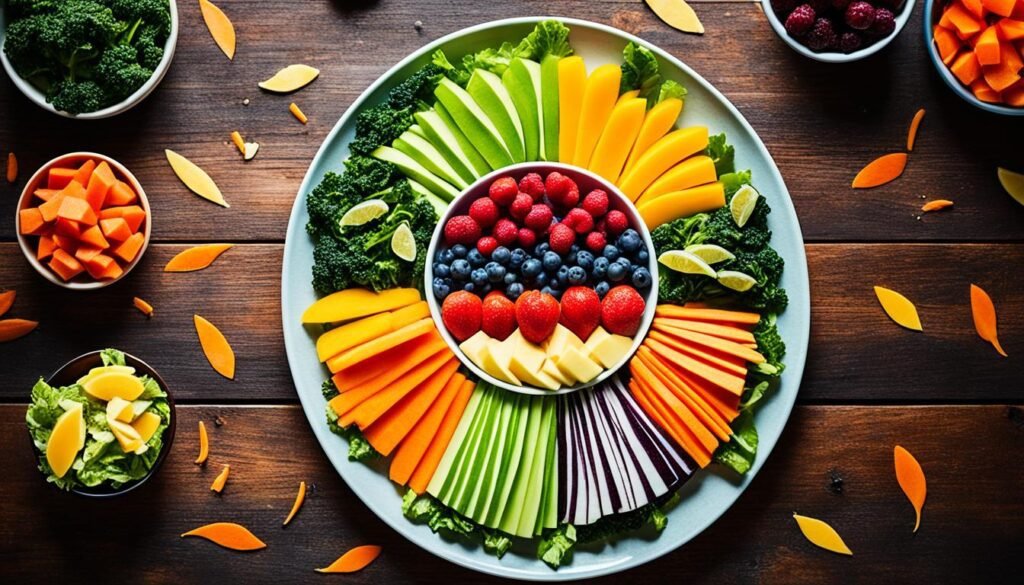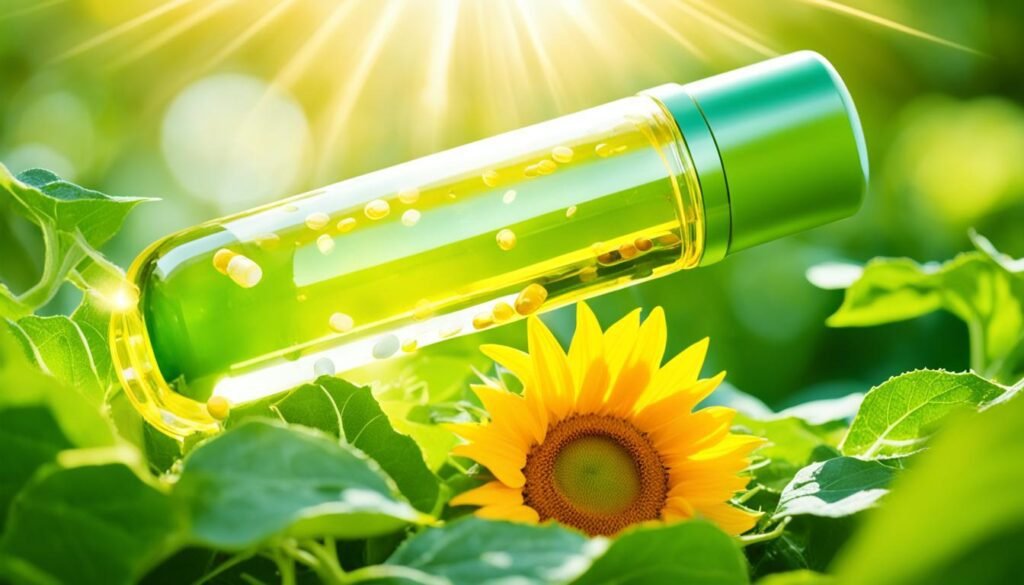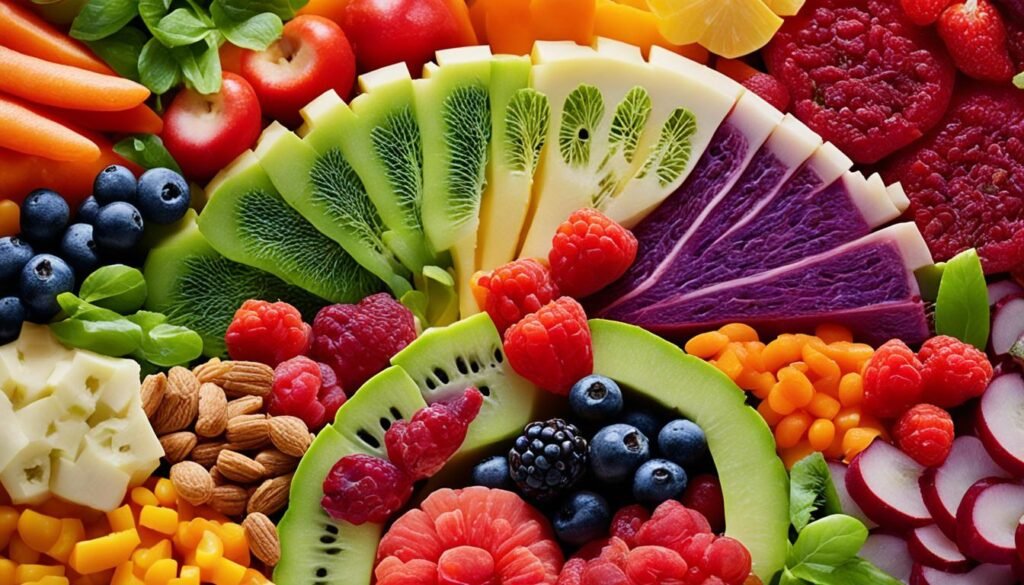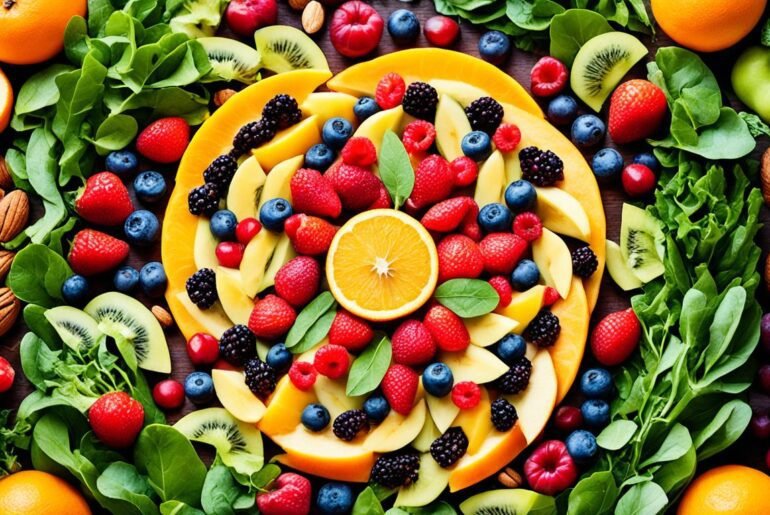Did you know that the health of your skin is influenced by what you eat? The food you consume plays a vital role in nourishing your skin from within and achieving that coveted, radiant glow.
When it comes to skincare, it’s not just about the products you apply topically. A balanced diet that includes skin-friendly foods can provide the essential nutrients and antioxidants needed to support skin health, prevent signs of aging, and promote a clear and radiant complexion.
In this article, I will share with you valuable diet tips for healthy glowing skin. Whether you’re looking to improve your skin’s appearance or maintain its youthful vigor, these tips will help you unlock the secret to beautifully nourished skin.
Key Takeaways:
- Include a variety of fruits and vegetables rich in antioxidants like vitamin C and E in your diet to protect against cellular damage and promote healthy skin cell development.
- Incorporate omega-3 fatty acids from sources like oily fish, flaxseeds, and chia seeds to support skin barrier function and maintain moisture and elasticity.
- Promote a healthy gut and improve skin health by including probiotic-rich foods and fiber in your diet.
- Stay hydrated by drinking enough water and consuming hydrating foods like watermelon and cucumbers for supple and youthful-looking skin.
- Avoid skin-damaging factors such as smoking, excessive alcohol consumption, and crash diets to prevent premature aging and skin damage.
The Importance of Nutrition for Skin Health
Proper nutrition plays a vital role in maintaining healthy and radiant skin. Your diet directly impacts the health and appearance of your skin, and incorporating the right nutrients can make a significant difference in achieving a glowing complexion.
When it comes to nutrition for healthy skin, there are several key factors to consider. Nutrients such as vitamin C, vitamin E, selenium, zinc, omega-3 fatty acids, and antioxidants all contribute to the overall health and vitality of your skin.
Vitamin C is known for its role in collagen production, which helps to maintain the skin’s elasticity and firmness. It also acts as a powerful antioxidant, protecting the skin from free radicals and oxidative damage. Citrus fruits, berries, and leafy greens are excellent sources of vitamin C.
Vitamin E is another essential nutrient for skin health. It is a potent antioxidant that helps to reduce inflammation and repair damaged skin cells. Foods rich in vitamin E include almonds, avocados, sunflower seeds, and olive oil.
Selenium and zinc are minerals that support skin health by promoting cell repair and rejuvenation. Selenium can be found in Brazil nuts, while zinc is abundant in fish and poultry.
Omega-3 fatty acids are crucial for maintaining good skin health. They help to reduce inflammation, protect the skin from sun damage, and keep it hydrated and supple. Fatty fish like salmon, flaxseeds, chia seeds, and walnuts are excellent sources of omega-3 fatty acids.
Antioxidants are essential for protecting the skin from environmental damage and premature aging. They help to neutralize free radicals and promote a healthy, youthful complexion. You can find antioxidants in a wide range of fruits and vegetables, such as berries, spinach, and tomatoes.
A well-rounded diet that includes a variety of fruits, vegetables, whole grains, lean proteins, and healthy fats will provide your skin with the necessary nutrients to thrive.
A balanced and nutritious diet is the foundation for healthy and radiant skin.
In addition to promoting skin health, a healthy diet also supports overall well-being. Eating nutrient-rich foods not only benefits the skin but also contributes to a stronger immune system, increased energy levels, and better overall health.
To complement your healthy eating habits, it’s also important to stay hydrated. Drinking an adequate amount of water throughout the day helps to flush out toxins and keeps your skin properly moisturized.
Remember, achieving healthy and glowing skin goes beyond skincare products alone. Nourishing your skin from the inside through a well-balanced diet is equally as important.
| Key Nutrient | Food Sources |
|---|---|
| Vitamin C | Citrus fruits, berries, leafy greens |
| Vitamin E | Almonds, avocados, sunflower seeds, olive oil |
| Selenium | Brazil nuts |
| Zinc | Fish, poultry |
| Omega-3 Fatty Acids | Fatty fish (salmon, trout, sardines), flaxseeds, chia seeds, walnuts |
Top Foods for Glowing Skin

Incorporating certain foods into your diet can greatly benefit your skin. By including skin-friendly foods in your daily meals, you can nourish your skin from within and promote a healthy, radiant complexion.
Fruits and vegetables rich in antioxidants, such as vitamin C, are essential for maintaining clear and glowing skin. Berries, citrus fruits, and leafy greens are excellent sources of vitamin C and can protect your skin against cellular damage while promoting healthy skin cell development.
Vitamin E is another powerful antioxidant that helps protect the skin from oxidative damage. Foods like almonds and avocado are rich in vitamin E and can support your skin’s health and integrity.
| Antioxidant-rich Foods | Skin Benefits |
|---|---|
| Berries | Protect against cellular damage and promote healthy skin cell development |
| Citrus fruits | Rich in vitamin C, help brighten the skin and boost collagen production |
| Leafy greens (spinach, kale) | Abundant in vitamins and minerals, improve skin’s elasticity and prevent premature aging |
| Nuts (almonds) | High in vitamin E, provide antioxidant protection and help maintain skin’s moisture |
| Avocado | Rich in healthy fats and vitamin E, nourish and moisturize the skin |
Selenium, a mineral found in certain foods like Brazil nuts, plays a vital role in supporting skin health. Selenium-rich foods can contribute to radiant skin and may even offer protection against skin cancer.
Zinc is another essential nutrient for healthy skin. Fish, poultry, and other zinc-rich foods aid in skin repair, keep the skin supple, and enhance overall skin health.
“A well-nourished body is reflected in healthy and vibrant skin.” – Dr. Jessica Carter
Incorporating healthy fats into your diet is crucial for providing natural moisturization to your skin. Avocados, oily fish like salmon, and nuts are excellent sources of healthy fats that can keep your skin hydrated and supple.
Phyto-estrogens, found in soy and whole grains, can help balance hormones and contribute to improved skin health.
Additionally, maintaining proper hydration is essential for achieving and maintaining youthful-looking skin. Drinking enough water and choosing low-glycemic index (GI) carbohydrates can help maintain skin health and prevent dehydration.
Remember, a diet rich in skin-friendly foods is not only beneficial for your skin but also for your overall well-being. By nourishing your body with the right nutrients, you can unlock the secret to achieving a glowing and radiant complexion.
The Role of Vitamin C in Skin Health
Vitamin C is a vital nutrient for maintaining healthy skin. Along with its powerful antioxidant properties, vitamin C contributes to collagen production, which is essential for maintaining the skin’s structure and elasticity.
Collagen is a protein that provides strength and support to the skin. As we age, collagen production naturally decreases, leading to wrinkles, fine lines, and sagging skin. By incorporating vitamin C-rich foods into your diet, you can help stimulate collagen synthesis and promote youthful-looking skin.
Some of the best food sources of vitamin C include:
- Citrus fruits like oranges, lemons, and grapefruits
- Berries such as strawberries, blueberries, and raspberries
- Kiwi
- Cruciferous vegetables like broccoli and Brussels sprouts
In addition to its collagen-boosting benefits, vitamin C also acts as a potent antioxidant, protecting the skin from free radicals and oxidative stress. Free radicals are unstable molecules that can damage the skin’s cells and accelerate the aging process. By neutralizing these free radicals, vitamin C helps prevent premature aging and supports overall skin health.
To further enhance the benefits of vitamin C, you can also consider incorporating topical vitamin C products into your skincare routine. These products can help deliver vitamin C directly to the skin and enhance its antioxidant and collagen-boosting effects.
By including vitamin C-rich foods in your diet and considering topical vitamin C products, you can harness the power of this nutrient to promote healthy, youthful skin.
The Power of Vitamin E for Skin

Vitamin E is an essential nutrient that plays a significant role in maintaining healthy skin. As an antioxidant, it helps protect the skin from oxidative damage caused by free radicals. Additionally, vitamin E aids in repairing damaged skin cells and promoting overall skin health. Including vitamin E-rich foods in your diet can provide numerous benefits for your skin.
The Benefits of Vitamin E for Skin:
- Antioxidant Protection: Vitamin E neutralizes free radicals, which can cause premature aging and damage to the skin.
- Moisturization: It helps to lock in moisture, keeping the skin hydrated and preventing dryness.
- Skin Repair: Vitamin E contributes to the repair and regeneration of skin cells, promoting faster healing and reducing the appearance of scars.
- Sun Protection: It acts as a natural sun protectant, safeguarding the skin against harmful UV rays.
- Anti-Inflammatory Properties: Vitamin E has anti-inflammatory effects that can help calm irritated skin and reduce redness.
Foods High in Vitamin E:
To incorporate more vitamin E into your diet, consider including the following foods:
| Food | Vitamin E Content (per 100g) |
|---|---|
| Almonds | 25.63 mg |
| Avocado | 2.07 mg |
| Sunflower Seeds | 35.17 mg |
| Olive Oil | 14.35 mg |
Vitamin E is a powerful nutrient that supports skin health and protects against damage. Including vitamin E-rich foods in your diet can contribute to healthier, more radiant skin.
The Importance of Omega-3 Fatty Acids for Skin Health
Omega-3 fatty acids play a crucial role in maintaining healthy and vibrant skin. Not only do they provide numerous benefits for overall health, but they also contribute to the well-being of our skin. These essential fatty acids have been found to have anti-inflammatory properties, which can help reduce skin inflammation and calm various skin conditions.
Omega-3 fatty acids also play a crucial role in supporting the skin’s barrier function. The outermost layer of our skin acts as a protective barrier, preventing moisture loss and keeping harmful bacteria and irritants at bay. An adequate intake of omega-3 fatty acids helps maintain the integrity and strength of this barrier, promoting healthy and hydrated skin.
In addition to their anti-inflammatory and barrier-supporting properties, omega-3 fatty acids also help to maintain skin moisture and elasticity. They play a vital role in the production of the skin’s natural oil barrier, keeping it supple and preventing dryness and premature aging.
So, which foods are high in omega-3 fatty acids? Incorporating these foods into your diet can provide your skin with the nourishment it needs:
| Foods High in Omega-3 Fatty Acids |
|---|
| Salmon |
| Trout |
| Sardines |
| Flaxseeds |
| Chia Seeds |
| Walnuts |
Adding these omega-3 rich foods to your diet can greatly benefit your skin and enhance its health and appearance. Whether you choose to incorporate them into your daily meals or as snacks, the omega-3 fatty acids they provide will work wonders for your skin.
Incorporating omega-3 fatty acids into your diet can help nourish your skin from within. By providing anti-inflammatory properties, supporting the skin’s barrier function, and promoting moisture and elasticity, these essential fatty acids are a powerful ally for maintaining healthy and radiant skin.
Gut Health and Skin Health Connection

The health of your gut is closely linked to the health of your skin. A balanced and diverse gut microbiome supports proper digestion, nutrient absorption, and immune function, all of which contribute to healthy skin.
Including probiotic-rich foods like kefir and fermented vegetables, as well as fiber from fruits, vegetables, and whole grains, can promote a healthy gut and improve skin health.
“A balanced and diverse gut microbiome supports proper digestion, nutrient absorption, and immune function, all of which contribute to healthy skin.”
Hydration and Skin Health

Proper hydration is crucial for maintaining healthy and glowing skin. Staying hydrated not only quenches your body’s thirst but also nourishes your skin from within, promoting its elasticity and overall health. Dehydration can lead to dryness, flakiness, and a dull complexion, emphasizing the importance of water for skin.
Water is the essential building block of life, and it plays a vital role in skin hydration. It helps to replenish skin tissues, regulate body temperature, and remove toxins. Drinking an adequate amount of water throughout the day helps to flush out impurities and maintain optimal skin moisture levels.
However, hydration doesn’t rely solely on drinking water. Certain foods are also excellent sources of hydration, providing additional benefits for your skin. Including hydrating foods in your diet can support your skin’s moisture balance and contribute to a healthy, radiant complexion.
- Fruits like watermelon, oranges, and berries have high water content and are rich in vitamins and antioxidants that promote skin health. They not only hydrate your skin but also protect it from damage caused by free radicals.
- Cucumbers are another hydrating food that can be beneficial for your skin. With their high water content and cooling properties, cucumbers help to moisturize, soothe, and reduce puffiness in the skin.
By incorporating these hydrating foods into your diet, you can enjoy the benefits of optimal hydration for your skin. Remember, achieving and maintaining healthy skin goes beyond surface-level care. Nourishing your body with water and hydrating foods is a key step towards a vibrant and glowing complexion.
Avoiding Skin Damaging Factors
In addition to maintaining a healthy diet, certain lifestyle choices play a crucial role in maintaining the health of your skin. By avoiding certain factors, you can prevent skin damage and accelerate the signs of aging. Here are some habits for healthy skin:
Avoid Smoking
Smoking not only poses serious health risks but also damages your skin. The chemicals in tobacco smoke can constrict blood vessels, reducing blood flow to the skin, and depriving it of oxygen and vital nutrients. Over time, this can lead to a dull complexion, wrinkles, and premature aging. Quitting smoking is not only beneficial for your overall health but also for the health and appearance of your skin.
Moderate Alcohol Consumption
Excessive alcohol consumption can take a toll on your skin. Alcohol is known to dehydrate the body, which can lead to dry and dull skin. It can also dilate blood vessels, causing redness and broken capillaries. Additionally, alcohol can disrupt the balance of hormones and impair liver function, both of which can affect the health and appearance of your skin. It’s important to consume alcohol in moderation and stay hydrated to maintain skin health.
Avoid Crash Diets
While crash diets may promise quick weight loss, they can have detrimental effects on your skin. Rapid weight loss can rob your skin of essential nutrients and cause it to appear saggy or dull. It can also lead to nutrient deficiencies, which are essential for maintaining healthy skin. Instead of opting for crash diets, focus on adopting a balanced and sustainable approach to weight loss, which will benefit both your overall health and the health of your skin.
Protect Your Skin from the Sun
Exposure to the sun’s harmful UV rays can cause significant damage to your skin. Prolonged sun exposure can lead to sunburns, premature aging, and an increased risk of skin cancer. To protect your skin, ensure you apply broad-spectrum sunscreen with at least SPF 30 before going outdoors. Wear protective clothing, such as hats and sunglasses, and seek shade during the peak hours of the sun’s rays. Sunscreen should be used daily, regardless of the weather or your plans for the day.
Keeping your skin healthy involves more than just following a proper skincare routine and diet. By avoiding smoking, excessive alcohol consumption, crash diets, and protecting your skin from sun damage, you can maintain a vibrant and youthful complexion.
Conclusion
In conclusion, maintaining healthy and glowing skin starts from within. By incorporating a balanced diet rich in fruits, vegetables, healthy fats, and hydration, you can provide your skin with the essential nutrients it needs for optimal health. The vitamins, minerals, antioxidants, and omega-3 fatty acids found in these food groups contribute to collagen production, protect the skin from damage, reduce inflammation, and maintain moisture levels.
It’s important to remember that diet is just one piece of the puzzle. Consistency in skincare habits, such as using sunscreen, cleansing, moisturizing, and avoiding harmful habits like smoking and excessive alcohol consumption, also play a crucial role in maintaining skin health.
By following these diet tips and embracing a holistic approach to skincare, you can unlock the secret to radiant and glowing skin. So start nourishing your skin from the inside out and enjoy the benefits of a healthy and vibrant complexion.
FAQ
What is the importance of nutrition for skin health?
Nutrition plays a crucial role in maintaining healthy skin. A balanced diet that includes essential nutrients like vitamins, minerals, antioxidants, and healthy fats supports collagen production, protects against oxidative damage, and promotes overall skin health.
What are the top foods for glowing skin?
Foods that promote glowing skin include fruits and vegetables rich in antioxidants, such as berries, citrus fruits, and leafy greens. Other skin-friendly foods include healthy fats like avocados, nuts, and oily fish, as well as foods high in vitamins C and E, like almonds, sunflower seeds, and olive oil.
How does Vitamin C contribute to skin health?
Vitamin C is a powerful antioxidant that protects against oxidative damage, supports collagen production, and promotes healthy skin cell development. Foods rich in vitamin C, such as citrus fruits, berries, kiwi, and cruciferous vegetables like broccoli, should be included in a skin-healthy diet.
What is the role of Vitamin E in skin health?
Vitamin E is an antioxidant that helps protect the skin from oxidative damage and supports skin repair. Foods like almonds, avocados, sunflower seeds, and olive oil are rich in vitamin E and should be included in a diet for glowing skin.
How do Omega-3 fatty acids benefit the skin?
Omega-3 fatty acids have anti-inflammatory properties, support skin barrier function, and help maintain skin moisture and elasticity. Including oily fish like salmon, trout, and sardines, as well as flaxseeds, chia seeds, and walnuts, in your diet can provide these essential nutrients for skin health.
What is the connection between gut health and skin health?
A balanced and diverse gut microbiome supports proper digestion, nutrient absorption, and immune function, all of which contribute to healthy skin. Including probiotic-rich foods like kefir and fermented vegetables, as well as fiber from fruits, vegetables, and whole grains, can promote a healthy gut and improve skin health.
How does hydration impact skin health?
Proper hydration is essential for maintaining healthy and glowing skin. Staying hydrated helps maintain skin elasticity, reduce the appearance of wrinkles, and flush out toxins. Drinking enough water and incorporating hydrating foods like watermelon, cucumbers, and berries can support skin hydration.
What factors should be avoided to prevent skin damage?
To maintain healthy skin, it’s important to avoid smoking, excessive alcohol consumption, and crash diets. These factors can damage the skin and accelerate signs of aging. Protecting the skin from sun damage with sunscreen and proper skincare is also crucial for maintaining skin health.
What are the key diet tips for healthy and glowing skin?
To nourish your skin from within, incorporate a balanced diet that includes fruits, vegetables, healthy fats, and adequate hydration. Include foods rich in vitamins C and E, omega-3 fatty acids, and antioxidants. Pay attention to gut health, avoid skin-damaging factors, and maintain a consistent skincare routine.




